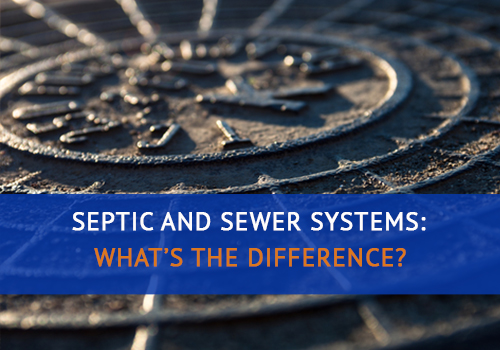Often, the words septic and sewer are thrown around in topics regarding wastewater treatment. These words may seem like they’re the same thing, but they’re not. Sewer and septic actually refer to two different types of systems.
Although both types of systems serve the same purpose, wastewater, and drainage treatment, their scales and operations are entirely different. To put it simply, the type of wastewater treatment system you have depends on your property’s location and municipality.
Let’s take a moment to go over the differences between septic and sewer and each types pros and cons.

What is a Sewer System?
A sewer system is larger, public system that is maintained and serviced by the local official public works department. These systems are built with city-owned pipes, which organize and connect an entire community. This means multiple houses are connected to the same wastewater treatment facility.
These municipal facilities are where solid waste and other organic components are filtered out. After the processing, the purified water is then added back into the local water source.
Typically, your house operates on a sewer system if your property exists within the municipal limits that require you to be a part of one. This type of system comes with some advantages and disadvantages.
Sewer System Pros
The city owns the sewer system’s pipes and centralized treatment facility. Therefore, the municipality is responsible for the sewer system, meaning that the town takes care of repairs and maintenance. So, if you have a problem with the sewer system, you contact the city to deal with the issue. As a property owner, you aren’t responsible for fixing the problem yourself aside from the short pipe that connects your house to the system.
Also, a sewer system is designed to manage large amounts of wastewater, so there’s a lower chance of flooding during Florida’s rainy season.
Sewer System Cons
If you own property that has a sewer system, you pay a monthly fee to the city. When sewer system requires extensive repairs or renovations, it could mean that you pay a more substantial fee depending on the month and work needed.
If you build a new home in the middle of a municipality, you have to pay an “impact” fee to integrate the new property into the system. This can end up costing you a lot of money.
The wastewater in a sewer system goes to a larger treatment facility, meaning that the water often is treated with chemicals (like chlorine) before it’s put back into the local water source.
What is a Septic System?
Clearly, Advanced Septic Services assists properties that have a septic system. So, this is what we do (and know) best!
A septic system is a self-contained, singular system that is usually found in rural properties, but not always. It is not connected to a larger network but instead processes the wastewater of an individual house or property. The waste from a home is taken to a septic tank, where it is decomposed by effluent bacteria. After given ample time to breakdown the organic waste, the wastewater is sent to a drain field where it is further filtered into the ground and back into the local water source.
It should come as no surprise that like all things in life, septic systems also have their ups and downs.
Septic System Pros
Unlike a sewer system, there are no monthly fees that you must pay to the city. Typically, significant repairs are easy to prepare for if you keep up regular maintenance and inspections. But, depending on the repairs, they could be costly.
Septic systems are more common in rural places, which allows the property-owner more freedom when building or developing the land. However, this does not go without its own rules and regulations.
Interestingly, many consider a septic system to be a greener option to sewer systems because there is less machinery involved in the filtering process. Septic systems also depend on effluent bacteria to breakdown waste, rather than using chemicals to kill off bacteria and other pathogens.
Septic System Cons
Property owners are responsible for all of the maintenance and repairs needed for their own septic system. That means when there’s an emergency, you will have to contact your septic professional and pay for the costs of repairs yourself.
You must stay on top of maintenance yourself. It’s not difficult to schedule regular inspections with your trusted septic company, but it is your responsibility as a property owner with a septic system.
To Conclude…
When it comes to septic and sewer systems, they have the same primary function. Both systems process and treat wastewater. Property owners don’t necessarily have a choice in which system that use, mainly because of municipality regulations. However, both systems have their pros and cons.
If you have questions about your septic system, its regulations, and its maintenance, contact us at Advanced Septic Services.

